Puerto Ricans are fleeing en masse amid slow hurricane recovery, lack of potable water
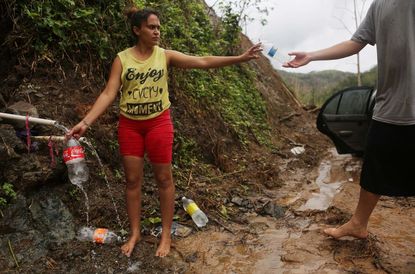

Three weeks after Hurricane Maria slammed Puerto Rico on Sept. 20, 85 percent of the U.S. territory doesn't have power, 40 percent of residents don't have drinkable water, and with so many homes destroyed and conditions improving at a slow pace, tens of thousands of Puerto Ricans have fled to the continental U.S., some of them probably permanently. The Trump administration let its Jones Act waiver lapse on Sunday night, with no plans to reinstate it, and Gov. Ricardo Rosselló told CBS News correspondent David Begnaud on Tuesday that he would prefer the shipping restrictions be lifted again, because "at this juncture, why not use all the tools available?"
The death toll from the hurricane is officially about 34, though it's probably higher, and Rosselló told Begnaud he's really worried about a public health crisis tied to contaminated water. At least two people have died from the bacterial infection leptospirosis and at least five others are being treated for symptoms.
"It's really hard to find clean drinking water on this island," Begnaud said in his report Tuesday night. Rosselló "has taken it delicately, I would say, with FEMA and his federal partners. He's given credit to FEMA and the federal government, President Trump specifically, for helping him out, but whatever help is being given is not happening enough, that's the bottom line. It's three weeks since this hurricane, and there's not enough water on this island, that people so desperately need."
Subscribe to The Week
Escape your echo chamber. Get the facts behind the news, plus analysis from multiple perspectives.

Sign up for The Week's Free Newsletters
From our morning news briefing to a weekly Good News Newsletter, get the best of The Week delivered directly to your inbox.
From our morning news briefing to a weekly Good News Newsletter, get the best of The Week delivered directly to your inbox.
"What do you want from your government?" Begnaud asked local police officer Daniel Pacheco. "Just to show up," he said. "We're just asking for people to move the gas, people to move the food."
Create an account with the same email registered to your subscription to unlock access.
Sign up for Today's Best Articles in your inbox
A free daily email with the biggest news stories of the day – and the best features from TheWeek.com
Peter has worked as a news and culture writer and editor at The Week since the site's launch in 2008. He covers politics, world affairs, religion and cultural currents. His journalism career began as a copy editor at a financial newswire and has included editorial positions at The New York Times Magazine, Facts on File, and Oregon State University.
-
 'Make legal immigration a more plausible option'
'Make legal immigration a more plausible option'Instant Opinion Opinion, comment and editorials of the day
By Harold Maass, The Week US Published
-
 LA-to-Las Vegas high-speed rail line breaks ground
LA-to-Las Vegas high-speed rail line breaks groundSpeed Read The railway will be ready as soon as 2028
By Peter Weber, The Week US Published
-
 Israel's military intelligence chief resigns
Israel's military intelligence chief resignsSpeed Read Maj. Gen. Aharon Haliva is the first leader to quit for failing to prevent the Hamas attack in October
By Justin Klawans, The Week US Published
-
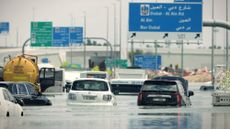 Arid Gulf states hit with year's worth of rain
Arid Gulf states hit with year's worth of rainSpeed Read The historic flooding in Dubai is tied to climate change
By Peter Weber, The Week US Published
-
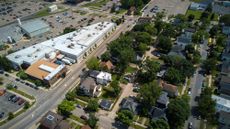 EPA limits carcinogenic emissions at 218 US plants
EPA limits carcinogenic emissions at 218 US plantsSpeed Read The new rule aims to reduce cancer-causing air pollution in areas like Louisiana's 'Cancer Alley'
By Peter Weber, The Week US Published
-
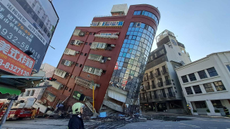 Strong Taiwan earthquake kills 9, injures hundreds
Strong Taiwan earthquake kills 9, injures hundredsSpeed Read At magnitude 7.4, this was Taiwan's biggest earthquake in 25 years
By Peter Weber, The Week US Published
-
 EPA sets auto pollution rule that boosts EVs
EPA sets auto pollution rule that boosts EVsSpeed Read The Biden administration's new rules will push US automakers toward electric vehicles and hybrids
By Peter Weber, The Week US Published
-
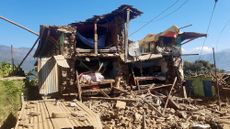 More than 150 people dead following earthquake in Nepal
More than 150 people dead following earthquake in NepalSpeed Read The death toll is expected to rise as rescue workers continue digging through rubble
By Justin Klawans, The Week US Published
-
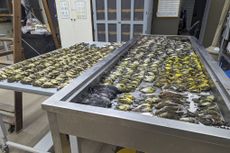 Nearly 1,000 birds dead in one night after striking building in Chicago
Nearly 1,000 birds dead in one night after striking building in ChicagoSpeed Read The birds died after colliding with the McCormick Place convention center next to Lake Michigan
By Justin Klawans Published
-
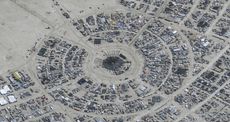 At least 1 dead at Burning Man as thousands remain stranded from flooding
At least 1 dead at Burning Man as thousands remain stranded from floodingSpeed Read
By Justin Klawans Published
-
 Earthquake rattles Southern California as Tropical Storm Hilary hits
Earthquake rattles Southern California as Tropical Storm Hilary hitsSpeed Read
By Catherine Garcia Published
